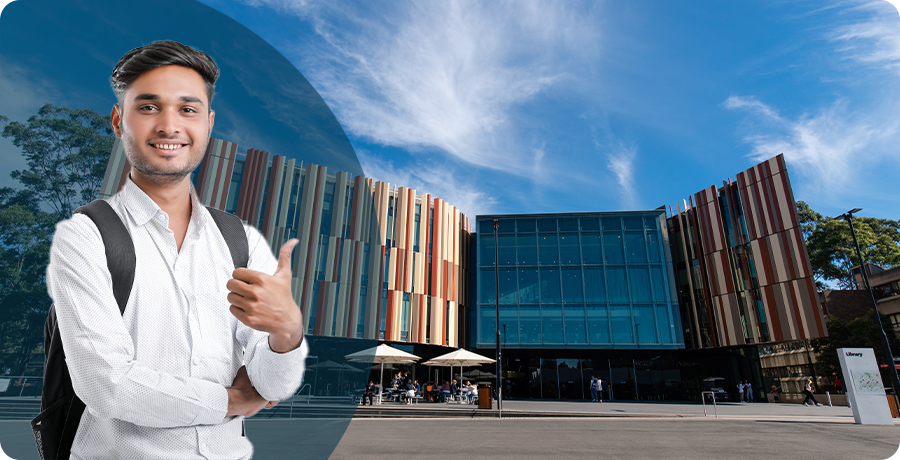Finding Your Way Through the Australian Educational System: Key Differences and Perspectives
Sulekha Study Abroad: From Expert Guidance to Global Opportunities.
- Comprehensive Guidance: Expert advice on universities, courses, and scholarships.
- Top Destinations: Insights into renowned study-abroad countries.
- Up-to-date data: Information on foreign entrance exams, deadlines & accreditation.
- Personal Growth: Cultural immersion, independence, and global perspective.
- Enhanced Support: NEHA Chatbot for instant answers and guidance.
- Expert Consultation: Personalized advice from verified professionals.
Australia is one of the leading countries globally, advocated as a world-class educational destination. It offers thousands of international students the best quality education and job opportunities. The academic degree conferred by Australian universities is accepted globally by companies and recruiters.
Australian Education System – A Brief
Australia provides a well-structured educational program. The Australian educational pattern is similar in all its six states, which include Queensland, Victoria, New South Wales, Tasmania, South Australia, Western Australia, and its two territories, namely the Northern Territory and Australian Capital Territory. When looking for an opportunity study-abroad option, there are several reasons to select the Australian continent as your primary study destination. However, a thorough understanding of their educational system is essential before completing the formalities to study in Australia.
Join top courses abroad, connect with SI-UK
Planning to do higher studies in the country can help students gain a well-planned study-based curriculum to develop their skills in many directions. Students can enhance their talent in creativity, analytical thinking power, critical analysis, ethical understanding, and more. Before deciding to get a student loan to study abroad in Australia, it is best to know more about the distinctive features of the Australian educational system.
The Australian employment system is a continuation of the academic system. Employability is given due importance and implanted through the educational curriculum and pupil assessment process. Teachers often discuss in-depth with graduate and postgraduate students on their learning, academic knowledge, and how they can be related to their future employability.
Undergraduate and Postgraduate Programs in Australia
In Australia, higher education is referred to as the tertiary educational level. It will help students pursue undergraduate, graduate, or postgraduate programs at deemed universities. On completion, they will be honored with a bachelor's degree, master's degree, or doctoral degree certificate. For example, a doctoral degree certificate will be conferred upon successful completion of MBBS in Australia for Indian students. The degree holders can also pursue non-clinical PG courses or programs in Australia. An Australian course means an academic program in their educational system.
What is Vocational Education Training in Australia?
Formal and advanced education in the continent is divided into four main stages. It comprises early childhood education, primary stage of education, secondary stage of education, and tertiary stage of education. Australia is notably the 3rd most significant provider of education to foreign students. At the tertiary level, students are given vocational training and education in junior college (2 or 3-year vocational programs) and at certain polytechnic institutes. Education at these levels during the college and polytechnic institutes helps the students gain an industrial associate degree.
Vocational educational training, or VET, is offered through federal, state, and industrial partnerships. It is designed specially to provide students with job opportunities immediately after graduation. Irrespective of classroom practical learning or online teaching, hundreds of vocational courses offer on-the-job training for students. There are government-aided TAFE or Technical And Further Education institutes, plus numerous other community educational centers imparting vocational training. Students can also seek out private Registered Training Organizations or RTO.
VET skills and qualifications involve four levels for gaining certifications. They include certificates 1,2,3, and 4. Indian students studying abroad can also find diploma VET courses and advanced VET courses, which depend on study years, occupational skills, and level of experience gained through practical work.
How is the Australian Education System Different from Other Countries?
Australia provides both public as well as private education centers. Both options can be explored. The public schools are government-funded centers. The public schools offer funding on a per-student basis wherein the full cost of the educational fees is subsidized and made affordable. Students desiring economic options may prefer public educational centers.
The independent educational system depends on fundings via donations and student tuition fees. The private institutes also depend on government funds on a per-student basis. Unlike other countries, there is no difference in the top-quality of education or the experienced teaching faculty irrespective of a private or public school or institute.
Australia sets a different education pathway for all its students by introducing the Australian Qualifications Framework. The AQF is considered the backbone of the Australian educational system, well-designed and meticulously planned. This unique structure was adopted in the year 1995. The AQF provides valid certificates to students in the primary, secondary, and tertiary educational levels. It encompasses higher education, vocational, and other training courses (VET). It is administered by the Australian Department of Education, Skills, and Employment.
Some Unique Features of the Education System in Australia
- Multicultural Society: The continent has more than 700,000 foreign students. The schools and institutes offer simple and quickly accessible student-friendly supportive services. Australia's multicultural community also makes it a favorite study destination for international students. The rich, diverse culture encourages more and more students from foreign backgrounds to join their academic centers.
- Top-class Australian Universities: You can learn at some of Australia's world-renowned universities. The best-ranked and research-based Australian universities include the Australian National University, the University of Melbourne, the University of Sydney, Queensland University, Adelaide University, Western Australia, Monash University, and UNSW Sydney. The above-mentioned Go8 universities are ranked under the top 150 global universities in the list of best universities globally.
- Student-friendly Education System : With more than 22,000 study courses offered by 1,100 institutions, Australia stands among other top-ranking countries that offer higher education systems. The education pattern stresses the role of active student participation and engagement. Students are requested to get involved in the learning via discussions and debates. Surveys done in the past decade of Indian students studying abroad in Australia indicate that international students have reported great satisfaction in living, studying, and working in Australia.
- Advanced Courses: Students can choose from a wide range of courses. In 2019, the Australian education system offered 3000 plus scholarship awards and an equal number of short courses to potential applicants from more than 55 countries worldwide. With 15 Nobel laureates produced under their education system and almost 3 million international alumni spread across the globe, Australia is truly the most revered educational destination in the world.
- Emphasis on Practical Skills: The education focuses on practical skills and on-site learning. Most courses offer practical training and knowledge to prepare students for good job opportunities. Students learning vocational courses get ample training and hands-on experience before they complete their courses.
- Imparting Personalized Education: Teachers use advanced analytical tools to receive timely alerts to help students learn better. The students at risk of failure, getting stressed, or dropping out suddenly during their academic sessions are addressed quickly. All students are given equal access to learning equipment and materials. The administrators keep a strict vigil on students and see that none is lacking for these things.
- Focus on Graduate Outcomes: The university heads use strategic plans to highlight graduate employability. Students need to have the right knowledge, attributes, and reflective thinking abilities and identify their self-needs to gain a reputed career and contribute towards a better economy. The employability programs are comprehensive, focusing not just on on-campus job centers, but graduates are also provided with industry visits. These programs are meticulously planned to teach students to write an impressive resume and learn to master interview skills.
Recently Added Study Abroad Blogs
- Study in USA: Understanding Intakes and Seasons
- Indian Students' Mounting Spending on Overseas Education: Inflating Vistas and Finances
- Princeton University: Ranking, Courses, Admission, Fees, Scholarships & Placements
- Humboldt University of Berlin: Ranking, Courses, Admission, Fees, Scholarship & Placements
- Taking Up Post-Graduation Programs in The UK: What You Need To Know
- Swedish University of Agricultural Sciences: Ranking, Courses, Admission, Fees, Scholarship and Placements
- Finding Your Way Through the Australian Educational System: Key Differences and Perspectives
- Breaking Down Funds for STEM Bachelors Abroad
-
Monika Answered on 20/12/2023
Studying MBBS in the USA can cost between $30,000 and $60,000 per year, which doesn't include additional expenses like living costs and health insurance. For instance, renowned institutions in urban areas may have higher fees than universities in suburban or rural settings. In addition to tuition, Indian students need to consider other essential costs.
The approximate cost of living in the USA varies: housing ($1,000 to $2,500/month), food ($300 to $500/month), transportation ($70 to $120/month for public transit), utilities ($150 to $250/month), healthcare (a few hundred dollars/month), and miscellaneous expenses ($200 to $400/month).While the upfront costs can seem substantial, prospective students should explore financial aid opportunities, scholarships, and grants.
Many universities and private organizations in the USA provide financial assistance to international students based on merit or need. This financial support can significantly alleviate the overall cost of pursuing a medical degree. Researching specific universities is crucial to obtaining accurate and up-to-date information on fees and available financial aid.
Students should consider the overall environment, quality of education, and potential for research or clinical experience when selecting a university in the USA for their MBBS program. Connect with Sulekha Study Abroad Experts now!Read More(2)(0)Have questions about studying abroad? Ask NEHA, your study abroad companion!
Top Study Abroad Consultants
-
O
Services: Study Abroad
About:StudyinINDIA, a division of Orion Edutech is an NS Read moreStudyinINDIA, a division of Orion Edutech is an NSDC partnered and ISO 9001:2015 certified company. We aim to encourage and assist students to achieve their dreams of studying in India at a cost-effective package and well- informed professional guidance. Our highly dedicated team ensures that the students and parents are given complete support beginning from the pre-application process to follow-up post-admission. Vision: As Orion Edutech counsellors our view is to empower students to visu
Review: Best service i love there service
-
T
Services: Study Abroad,Management entrance exam coaching,Foreign education entrance exam coaching
About:Read moreTaksheela Institute of Education, initiated by a group of seasoned counsellors with diverse global education, is dedicated to moulding the future of students. With a distinguished faculty and mentor system, the institute delivers personalized guidance to enhance skills and foster excellence. Recognizing the uniqueness of each student, Taksheela adopts a tailored approach to support their learning journey. The comprehensive courses offered cover foundational concepts to advanced levels, ensuring a holistic knowledge base. Specializing in competitive exams such as IELTS, GRE, TOEFL, and SAT, the institute facilitates the pursuit of dream courses globally.
What Does Taksheela Institute Of Education, Kolkata, Offer?Services Offered- Assistance with documentation and admission processes
- Specialized coaching for IELTS, GRE, TOEFL, SAT
Success Rate- • Positive outcomes in academic pursuits
Partnered Countries- USA
- Australia
- Canada
- New Zealand
- UK
- European countries
- Asia
- Africa
Features/Facilities- Affordable consultation services
- Comprehensive support for career establishment
Taksheela Institute of Education, initiated by a group of seasoned counsellors with diverse global education, is dedicated to moulding the future of students. With a distinguished faculty and mentor system, the institute delivers personalized guidance to enhance skills and foster excellence. Recognizing the uniqueness of each student, Taksheela adopts a tailored approach to support their learning journey. The comprehensive courses offered cover foundational concepts to advanced levels, ensuring a holistic knowledge base. Specializing in competitive exams such as IELTS, GRE, TOEFL, and SAT, the institute facilitates the pursuit of dream courses globally.
What Does Taksheela Institute Of Education, Kolkata, Offer?Services Offered- Assistance with documentation and admission processes
- Specialized coaching for IELTS, GRE, TOEFL, SAT
Success Rate- • Positive outcomes in academic pursuits
Partnered Countries- USA
- Australia
- Canada
- New Zealand
- UK
- European countries
- Asia
- Africa
Features/Facilities- Affordable consultation services
- Comprehensive support for career establishment
Review: I joined the Taksheela Institute of Education and my experience here was wonderful. The Sir who taught me many things and also helped me for this PTE exam is called Arnab Chakraborty. He is a good teacher and was the person who was tutoring me from the very beginning of the course by helping me in places where I lacked the most. With time, he helped me to improve the things in which I was weak. He is a very kind teacher with a lot of experiences in him. The things that make him perfect is he never gives up on his students. The people over here are kind and also helpful.
-
C
Services: Study Abroad
About:Read moreCollegeLab is a distinguished counselling and mentoring service dedicated to guiding students aspiring for the world's premier universities. Boasting alumni from prestigious institutions like Oxford and Cambridge, their expertise extends across top universities globally. CollegeLab offers a comprehensive range of services, including premium counselling and mentoring, ensuring students receive tailored support for their academic journey. With a proven success rate, they have established partnerships with universities worldwide. Notably, CollegeLab goes beyond borders by providing expert guidance in overseas education, making it a one-stop solution for students seeking unparalleled assistance in pursuing their educational dreams.
What Does CLM College Mentoring Private Ltd, Kolkata, Offer?Services Offered- Premium Counselling
- Mentoring for Top Universities
Success Rate- • Alumni from Oxford and Cambridge
Partnered Countries- • UK, USA, Australia, Sweden and New Zealand
Features/Facilities- Expertise in multiple countries
- Tailored mentoring by alumni
CollegeLab is a distinguished counselling and mentoring service dedicated to guiding students aspiring for the world's premier universities. Boasting alumni from prestigious institutions like Oxford and Cambridge, their expertise extends across top universities globally. CollegeLab offers a comprehensive range of services, including premium counselling and mentoring, ensuring students receive tailored support for their academic journey. With a proven success rate, they have established partnerships with universities worldwide. Notably, CollegeLab goes beyond borders by providing expert guidance in overseas education, making it a one-stop solution for students seeking unparalleled assistance in pursuing their educational dreams.
What Does CLM College Mentoring Private Ltd, Kolkata, Offer?Services Offered- Premium Counselling
- Mentoring for Top Universities
Success Rate- • Alumni from Oxford and Cambridge
Partnered Countries- • UK, USA, Australia, Sweden and New Zealand
Features/Facilities- Expertise in multiple countries
- Tailored mentoring by alumni
-
D
Services: Study Abroad,Foreign language training
About:Read moreDream Academic Services is committed to achieving its goal of creating an environment where students not only learn but also grow and shine in their careers. It gives students wings to pave their way towards their dream studies with their desired destination. Students at Dream Academic Services are primed to achieve top scores in IELTS and take foreign language classes like German. Qualitative assistance is offered in getting admission to top-notch universities in Germany, the USA, the UK, Canada, Australia, and many more. They also offer comprehensive overseas education consultation, guiding students through the process of pursuing education in international institutions.
What Does Dream Academic Services, Kolkata, Offer?Services Offered- Overseas Education Consultation
- IELTS Training
Success Rate- • High achievement in IELTS
Partnered Countries- • Germany, USA, UK, Canada, Australia, and more
Features/Facilities- Expert guidance
- Language classes
- Admission assistance
Dream Academic Services is committed to achieving its goal of creating an environment where students not only learn but also grow and shine in their careers. It gives students wings to pave their way towards their dream studies with their desired destination. Students at Dream Academic Services are primed to achieve top scores in IELTS and take foreign language classes like German. Qualitative assistance is offered in getting admission to top-notch universities in Germany, the USA, the UK, Canada, Australia, and many more. They also offer comprehensive overseas education consultation, guiding students through the process of pursuing education in international institutions.
What Does Dream Academic Services, Kolkata, Offer?Services Offered- Overseas Education Consultation
- IELTS Training
Success Rate- • High achievement in IELTS
Partnered Countries- • Germany, USA, UK, Canada, Australia, and more
Features/Facilities- Expert guidance
- Language classes
- Admission assistance
-
Z
Services: Study Abroad
About:Read moreZenith Education Services, a top Overseas Education Consultancy, boasts a skilled team of counsellors committed to tailoring students' best study abroad options. With a focus on individual requirements, their USP lies in offering budget-friendly choices to students across all profiles. They provide comprehensive coaching for standardized tests like IELTS, GRE, and GMAT. Dedicated to facilitating seamless transitions for students aspiring to study overseas, Zenith Education Services offers comprehensive support and guidance throughout the entire process.
What Does Zenith Educational Services, Kolkota, Offer?Services OfferedCourse/University selection
Success RateTestimonials & Positive Feedback
Partnered CountriesUK
Features/FacilitiesTest Preparation: (GMAT, IELTS, GRE)
Zenith Education Services, a top Overseas Education Consultancy, boasts a skilled team of counsellors committed to tailoring students' best study abroad options. With a focus on individual requirements, their USP lies in offering budget-friendly choices to students across all profiles. They provide comprehensive coaching for standardized tests like IELTS, GRE, and GMAT. Dedicated to facilitating seamless transitions for students aspiring to study overseas, Zenith Education Services offers comprehensive support and guidance throughout the entire process.
What Does Zenith Educational Services, Kolkota, Offer?Services OfferedCourse/University selection
Success RateTestimonials & Positive Feedback
Partnered CountriesUK
Features/FacilitiesTest Preparation: (GMAT, IELTS, GRE)
Review: Transparency in the service and friendly in attitude
-
F
Services: Study Abroad,Finance certification tuitions,Professional accounting tuitions,CFA tuitions
About:FPA - Financial Planning Academy is a tech-driven Read moreFPA - Financial Planning Academy is a tech-driven educational training academy that has tremendous core expertise in transforming careers and making our learners achieve their globally desired outcomes. Our key areas of coaching are accounting, management, strategy, analytics, and finance. Get Trained for ACCA, CPA US, CFP CMA & CFA.
Review: Good Communication 5/5 responsiveness 5/5 good price 5/5 ontime services 5/5 Service Quality 5/5
-
Y
Services: Study Abroad,Immigration consultants,Visa consultants,US Visa consultants,Spoken english training,Management entrance exam coaching,Foreign education entrance exam coaching
About:Y-Axis is India’s No.1 Immigration & Visa Cons Read moreY-Axis is India’s No.1 Immigration & Visa Consultant and presumably the world’s largest B2C immigration firm. Established in 1999, our 42 company owned and managed offices across India, Dubai,London, Partner Offices in Melbourne & New Zealand and 1200+ employees have served over 100,000 happy customers. Y-Axis also employs and works with regulated & accredited immigration lawyers in our own office in Dubai,London and partner offices in Australia and New Zealand. Over 50% of our custo
Review: Dear Sir I want to go abroad please suggest suitable for me. This time I am working as a tender manager.kindly review my resume ASAP. Thanks Prasanna
-
P
Services: Study Abroad
About:Read morePetals International, founded in 2011, provides overseas education services to aspiring students in Delhi and the NCR region. With 13+ years of experience, they have emerged as a trusted partner in facilitating students' journeys towards higher education abroad. Their extensive services encompass guidance and support for education opportunities in renowned destinations such as the UK, Dubai, Mauritius, Malaysia, Ukraine, Singapore, Cyprus, and beyond. The dedicated team of certified trainers with 20+ years of experience at Petals International is committed to assisting aspiring students at every step of their academic pursuits. Contact today to discover the limitless possibilities that await in pursuing education overseas.
What Does Petals International, Kolkota, Offer?Services OfferedCourse/University selection
Success RateTestimonials & Positive feedback
Partnered CountriesSingapore
Features/FacilitiesTailored Applications
Petals International, founded in 2011, provides overseas education services to aspiring students in Delhi and the NCR region. With 13+ years of experience, they have emerged as a trusted partner in facilitating students' journeys towards higher education abroad. Their extensive services encompass guidance and support for education opportunities in renowned destinations such as the UK, Dubai, Mauritius, Malaysia, Ukraine, Singapore, Cyprus, and beyond. The dedicated team of certified trainers with 20+ years of experience at Petals International is committed to assisting aspiring students at every step of their academic pursuits. Contact today to discover the limitless possibilities that await in pursuing education overseas.
What Does Petals International, Kolkota, Offer?Services OfferedCourse/University selection
Success RateTestimonials & Positive feedback
Partnered CountriesSingapore
Features/FacilitiesTailored Applications
-
G
Services: Study Abroad
About:Overseas Education agent , Russia, Georgia, Philli Read moreOverseas Education agent , Russia, Georgia, Phillipines, hungry, Bangladesh, Kazakhstan Poland for MBBS course
Review: Glen education is one of the most trusted company links the best consultant ever. And helps us to make our dream come true with clearance.
-
S
Services: Study Abroad
About:Read moreSC Overseas Consultancy Services PVT Ltd (OCS) is promoted by Group of Professionals, located in Central Kolkata, Dalhousie Square at around of 1500 sq. ft. Mr. Sujoy Chowdhury, MD. of OCS, is in this profession for over 15 years. We have helped more than thousands of students to choose the right course/ University/ Country according to their educational/ financial background. Also, we provide FREE COUNSELLING to each & every student. They have highly experienced dedicated academic counsellors those are master’s degree holder from the reputed Universities in India. We provide complete admissions guidance for Government as well as Top private institutes/colleges/universities in USA, Australia, New Zealand, UK, and Singapore, assist you in getting student Visa, make travel arrangement, airport pick up & stay in Hostel/ with local family etc. So, if you have dream, we will make it true.
What Does Sc Overseas Consultancy Services Pvt. Ltd, Kolkata, Offer?Services Offered- Visa Assistance
Success Rate- - Over 15 Years of Professional Experience
Partnered Countries- - USA, Australia, New Zealand, UK, Singapore
Features/Facilities- Accommodation Support
SC Overseas Consultancy Services PVT Ltd (OCS) is promoted by Group of Professionals, located in Central Kolkata, Dalhousie Square at around of 1500 sq. ft. Mr. Sujoy Chowdhury, MD. of OCS, is in this profession for over 15 years. We have helped more than thousands of students to choose the right course/ University/ Country according to their educational/ financial background. Also, we provide FREE COUNSELLING to each & every student. They have highly experienced dedicated academic counsellors those are master’s degree holder from the reputed Universities in India. We provide complete admissions guidance for Government as well as Top private institutes/colleges/universities in USA, Australia, New Zealand, UK, and Singapore, assist you in getting student Visa, make travel arrangement, airport pick up & stay in Hostel/ with local family etc. So, if you have dream, we will make it true.
What Does Sc Overseas Consultancy Services Pvt. Ltd, Kolkata, Offer?Services Offered- Visa Assistance
Success Rate- - Over 15 Years of Professional Experience
Partnered Countries- - USA, Australia, New Zealand, UK, Singapore
Features/Facilities- Accommodation Support
Review: They've been really helpful throughout the whole process from application to the university to the application for visa. The staff is also really friendly and they've guided me really well throughout.
-
A
Services: Business colleges,Engineering Colleges,Medical Colleges,Law Colleges,Study Abroad,Management distance education,Arts & Humanities distance education,Finance & Accounts distance education,Computer science distance education,Agricultural Colleges,Dental Colleges,Homeopathy Colleges,Nursing Colleges,Pharmacy Colleges
About:Career counseling institute & Educational Cons Read moreCareer counseling institute & Educational Consultancy
-
M
Services: Study Abroad,Foreign education entrance exam coaching
About:Mavin Study Abroad is a fast growing study abroad Read moreMavin Study Abroad is a fast growing study abroad consultancy based in New Delhi, India- helping students to realize thier dream of study abroad. We also provides world-class Study Abroad consultancy and IELTS/TOEFL Training (online & offline)- which helps students achieve thier respective desired bands.
Review: I took my IELTS training through Mavin Study Abroad & achieved my desired band in mock test itself! The trainers are very professional & helpful. The portal is very user-friendly. I recommend Mavin for IELTS training to everyone.








.png)


.png)
.png)